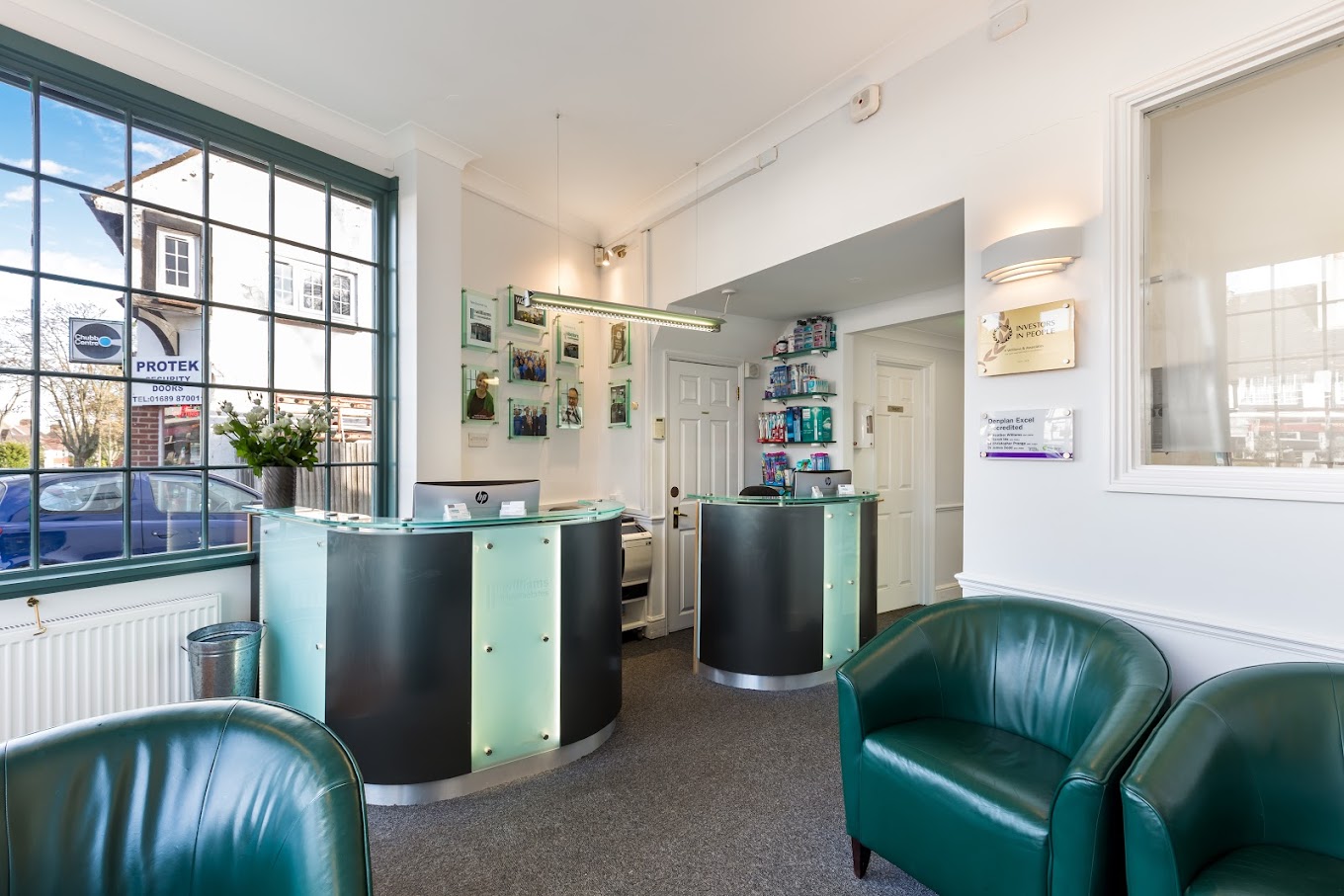Saturday Skin Clinic @ H Williams & Associates Dental Care
Our highly experienced Advanced Nurse Practitioner Caroline Wynne-Jones has been running our skin clinic for 10 years. If you have any of the symptoms on our service list, or you are just worried about a change happening to your skin, Caroline is here to help.
Book a consultation to discuss your concerns and any treatment that may be required by clicking the link below or by phoning reception on 01689 823636.
Click here to book your appointmentAt our clinic, we specialise in providing medical skin treatments for men, women and children. Our aim is to help you achieve healthy skin.
We always look as to why something is happening rather than just carrying out a procedure. We can make recommendations as to things a patient could change in their skin routine, in order to alter their future skin health.
See our services list for common treatments a our clinic.
What to Expect
A consultation with our skin expert is the first step towards any treatment. Consultations usually last around 15 minutes and cost £75.
Please note the clinic provides skin diagnosis and procedures only. We are not dermatologists.
Service list
- Warts
- Skin Tags
- Minor Lesions
- Epidermal Cysts
- Boils
- Abscesses
- Ingrowing hair follicles
- lympona
- mole assessments
- Ingrowing toe nails
- Verrucas (adults)
After your consultation
Following a consultation the normal outcomes are:
- No further action required: For example, you were concerned about a mole, and on examination we were able to confirm there is nothing to be worried about.
- A referral is needed: It is not possible to resolve the issue in the clinic, the issue is not likely to be treated simply or the issue may have a more significant underlying cause. In such cases, we would provide a letter for your NHS GP or private consultant. In some circumstances we may offer to take a sample for pathological analysis to help with the referral process.
- Treatment: The problem falls within the range of treatment we provide. We discuss what is required and any pre-treatment. We regularly undertake removal of skin tags, moles/naevi, seborrhoeic keratosis, warts, and verrucas
What if I need treatment in the clinic?
In the initial consultation we will discuss the treatment required. Often we recommend some pre-treatment with skin exfoliation, hyper-moisturizing or anti-bacterial soap for example.
We use anaesthetic gel prior to many treatments and the application of this will be discussed in the consultation.
Why pay for professional treatment?
It is important to treat any problems quickly and consistently. Sometimes using “over-the-counter” treatments may seem like the cheaper option but as well as damaging the skin, it may not alter the problem at all. You also need to be committed to treating the problem and sometimes a lack of time or consistency can cause the problems to get larger or sspread therefore prolonging the issue.

 Caroline Wynne-Jones RN MSc BA(Hons) Dip CC NMP
Caroline Wynne-Jones RN MSc BA(Hons) Dip CC NMP
Caroline is an Advanced Nurse Practitioner in the NHS.
• Qualified in 1990 as a Registered General Nurse and specialised initially within the area of cardiothoracic surgery and trauma before moving into cancer care and becoming a nurse consultant for lung cancer
• Worked in numerous roles as a nurse, ward sister, medical escort, matron, clinical nurse specialist and autonomous practitioner
• Currently working within the NHS as an Advanced Nurse Practitioner in rapid diagnostics – a service designed to investigate patients with nonspecific symptoms for signs of both benign diseases and cancers
• Specialist courses in Cardiothoracic nursing care, Research in Health Care, Chemotherapy administration and Minor Skin Surgery
• Diploma in Critical Care Management
• Ba (Hons) Nursing/Healthcare Management
• Post-graduate Diploma in physical assessment
• MSc in Cardio Respiratory nursing
• Independent non-medical prescribing qualification
• Currently undertaking an ultrasound course
Types of Skin Lesions
What is a skin tag?
A skin tag is a small, harmless growth of skin that appears on the surface of the skin. Skin tags are common and usually appear in areas of friction such as the neck, underarms, bustline and groin area. While skin tags are harmless, they can be a cosmetic concern for some people. At our clinic, we offer safe and effective treatments for skin tag removal.
A mini consultation will be required initially to assess the nature of the skin lesion removal £70, a surgery appointment will then be made for the procedure to take place from £300, a biopsy may be required from £300, followed by a free review appointment a week later.
Skin Tag Removal is:
- A pain-free procedure
- Quick and Easy
- No Recovery Time
What is a wart or a verruca?
Most warts and verrucas are caused by one of the many human papillomavirus (HPV). They are thick rough structures that usually occur on hands, and feet although it is possible to get them in other areas too. Whilst figuring out where you contracted a wart or verruca can be difficult, they often from the use of communal items or from being barefoot in wet areas such as showers or swimming venues. Warts are unlikely to be painful whereas verrucas often are – both can be painful and uncomfortable to remove. Removal of both of these types of growth is not a simple process and therefore we offer a plan for removal at our clinic that aims at getting rid of the wart or verruca for good.
What is a mole or naevi?
Moles or naevi are areas of skin cells that grow as a cluster on the skin. These are often harmless changes in the skin and are genetically determined and well defined in shape ranging in colour from skin colour to dark brown/black. On occasions these skin clusters can develop and become irregular in shape, structure and appearance. Any alterations should be examined especially if there is a history of high UV damage or family history
What is a seborrhoeic keratosis?
Seborrheic keratosis are irregular plaques of skin cells that build over time and are usually associated with family genetics and age. They often look like they sit on the skin and can be rough and dry. Sometimes they can be itchy and can cause irritation of the surrounding skin. They can vary in colour from yellow to dark brown/black. They tend to be benign structures.
.
Top Skin Tips
Why should both men and women look after their skin?
Healthy skin is not just about looking good, but it’s also essential for our overall health and well-being. Our skin is the largest organ in our body, and it protects us from harmful environmental factors such as UV radiation, pollution, and bacteria. By taking care of our skin, we can prevent skin problems such as acne, wrinkles, age spots and skin cancer and look younger than our years.
How to look after your skin?
There are several ways to look after your skin, including:
- Cleansing: Cleanse your skin twice a day to remove dirt, oil, and makeup.
- Exfoliating: Exfoliate once or twice a week to remove dead skin cells and unclog pores.
- Moisturizing: Use a moisturizer to keep your skin hydrated and nourished.
- Sun protection: Wear sunscreen every day, even on cloudy days, to protect your skin from harmful UV radiation.
- Hydration: Drink plenty of water to keep your skin hydrated from the inside out.
Why it is more important to look after your skin as you get older?
As we age, our skin becomes more fragile and prone to damage. Our skin’s natural ability to repair itself decreases, and it becomes thinner and drier. Our genetic make-up allows the development of aspects such as moles and keratosis plaques. Plus as we age we also don’t use the building blocks we are provided with effectively and this increases the chance of these structures forming.
Should children look after their skin?
Yes, it’s essential for children to learn how to take care of their skin from an early age. By establishing good skincare habits, children can prevent skin problems such as acne and sun damage. Encouraging children to wear sunscreen and practice good hygiene can help them maintain healthy skin for life. At our clinic, we offer a range of skincare treatments suitable for children.
See our General Advice for Minor Skin Surgery checklist
Useful links:
https://www.nhs.uk/conditions/moles/
https://www.nhs.uk/conditions/skin-tags/
https://www.nhs.uk/conditions/veruccas/
https://www.nhs.uk/conditions/warts/
https://www.bad.org.uk/pils/seborrhoeic-keratosis/
What our patients say....
-
Minor Skin SurgeryThe minor skin surgery treatment (removal of a mole)from Caroline Wynette-Jones was excellent. She spent time ensuring that I fully understood the procedure and at all times I felt reassured and confident. Highly recommended.
Skin Clinic
At our clinic, we specialise in providing medical skin treatments for men, women and children. Our aim is to help you achieve healthy skin.
We always look as to why something is happening rather than just carrying out a procedure. We can make recommendations as to things a patient could change in their skin routine, in order to alter their future skin health.

